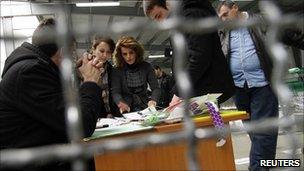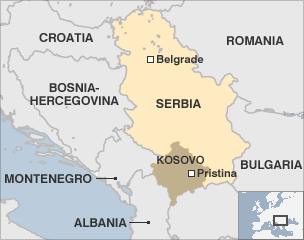Kosovo election prompts EU observer fraud claims
- Published

There were claims that voting was compromised in two of Kosovo's 37 districts
EU observers monitoring Sunday's parliamentary election in Kosovo have received "serious allegations of fraud" in two districts.
The head of the monitoring team, Doris Pack, said the election was generally well run but called for action against officials suspected of vote-rigging.
Prime Minister Hasim Thaci has claimed victory in the vote, Kosovo's first since independence.
But he is not thought likely to win the election outright.
According to early results, Mr Thaci's Democratic Party of Kosovo (PDK) gained almost 31% of the vote, a few points ahead of his main rival and ex-junior coalition partner, the Democratic League of Kosovo (LDK).
The LDK has called for re-runs, arguing that voting was compromised in two of Hasim Thaci's strongholds, where an unlikely 95% turnout was recorded.

Doris Pack, a German politician, said the turnout, at almost twice the average in Kosovo, was highly suspicious.
"I don't think that it is possible. Yes, in Russia before, or East Germany before, or even in China. But I think not in a country like Kosovo where we tried to install democratic structures," she said.
The US embassy added that it also had concerns about the voting. In a statement it said that Ambassador Christopher Dell had witnessed irregularities such as ballots outnumbering the number of signatures.
The Central Election Commission said on Sunday that the voting process had been a success, and technical hitches had "not hurt the process".
<bold>Serb participation</bold>
In Brussels, senior EU officials congratulated Kosovo's voters for the "calm and orderly manner in which the majority of the voting took place".
Ms Pack agreed that apart from the alleged fraud in two of Kosovo's 37 municipalities the election had passed off well.
She also praised "increased participation" of ethnic Serbs in Kosovo.
Belgrade has not recognised Kosovo's independence and most Serbs were expected to boycott the elections, although turnout in Serb enclaves in central Kosovo was higher than in previous elections.
The ethnic Albanian majority and small Serb minority remain largely estranged in Kosovo, more than a decade after a Nato-led conflict broke Serbia's control.
Serbs now number only about 120,000 out of Kosovo's population of two million. Much of the Serb population is concentrated in the north, between the divided town of Mitrovica and the Serbian border.
While recognised by many Western countries, Kosovo is still not a member of the UN. Its ethnic Albanian majority are under pressure to show they can build peaceful relations with the Serb minority.
- Published11 December 2010
- Published9 December 2010
- Published2 November 2010